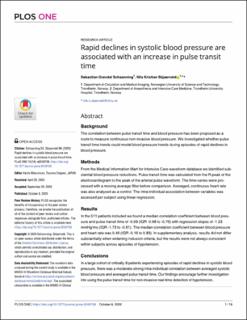Rapid declines in systolic blood pressure are associated with an increase in pulse transit time
Peer reviewed, Journal article
Published version
Permanent lenke
https://hdl.handle.net/11250/2689202Utgivelsesdato
2020Metadata
Vis full innførselSamlinger
Sammendrag
Background
The correlation between pulse transit time and blood pressure has been proposed as a route to measure continuous non-invasive blood pressure. We investigated whether pulse transit time trends could model blood pressure trends during episodes of rapid declines in blood pressure.
Methods
From the Medical Information Mart for Intensive Care waveform database we identified substantial blood pressure reductions. Pulse transit time was calculated from the R-peak of the electrocardiogram to the peak of the arterial pulse waveform. The time-series were processed with a moving average filter before comparison. Averaged, continuous heart rate was also analysed as a control. The intra-individual association between variables was assessed per subject using linear regression.
Results
In the 511 patients included we found a median correlation coefficient between blood pressure and pulse transit time of -0.93 (IQR -0.98 to -0.76) with regression slopes of -1.23 mmHg/ms (IQR -1.73 to -0.81). The median correlation coefficient between blood pressure and heart rate was 0.46 (IQR -0.16 to 0.83). In supplementary analysis, results did not differ substantially when widening inclusion criteria, but the results were not always consistent within subjects across episodes of hypotension.
Conclusions
In a large cohort of critically ill patients experiencing episodes of rapid declines in systolic blood pressure, there was a moderate-strong intra-individual correlation between averaged systolic blood pressure and averaged pulse transit time. Our findings encourage further investigation into using the pulse transit time for non-invasive real-time detection of hypotension.

